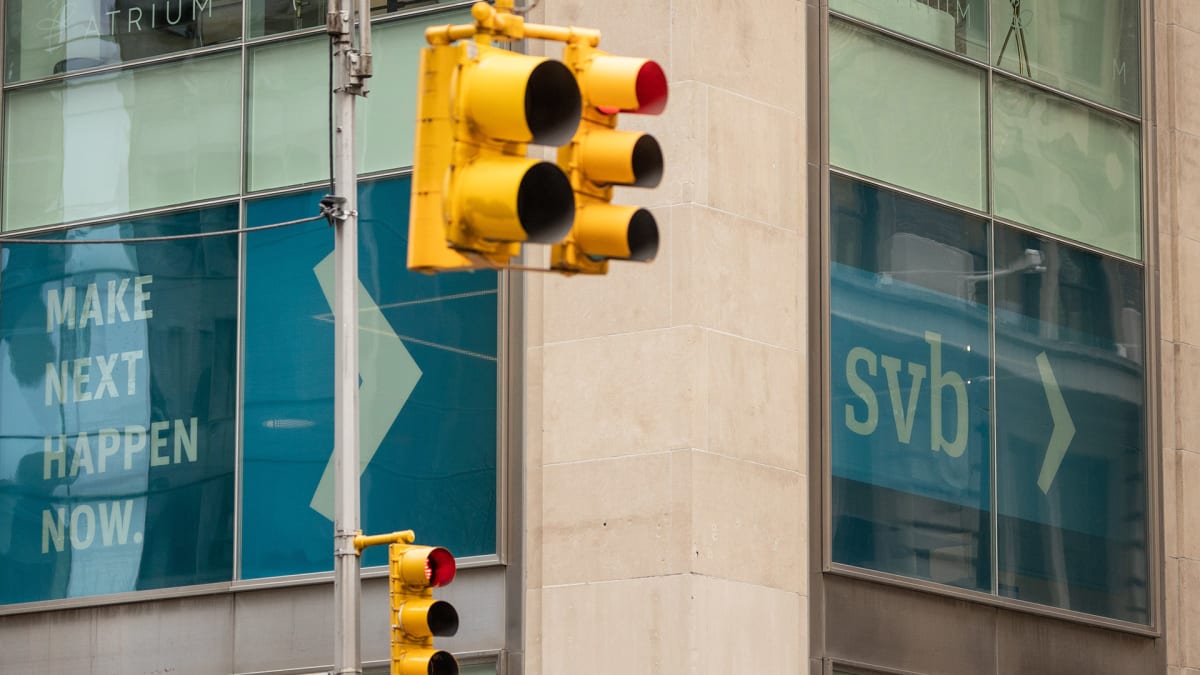
The creditors of Silicon Valley Bank's parent company, Silicon Financial Group, are arming themselves for a potential fight to receive the highest valuation of the company's assets.
Pimco, Centerbridge Partners and Davidson Kempner, plus additional investors already hired PJT Partners (PJT) in case the holding company files for bankruptcy, sources told The Wall Street Journal.
DON'T MISS: Credit Suisse Runs Into New Problems
Selling the private wealth unit and other divisions could net a profit for them, the sources said.
The creditors own a large amount of SVB Financial's bonds that were purchased over weekend as they plummeted to only 30 cents on the dollar, the WSJ reported. There are a total of $3.4 billion face value of bonds.
The group of creditors want SVB Financial to file for bankruptcy so the divisions of the business that are not related to the bank will be sold. A sale under the supervision of a bankruptcy proceeding could attract a larger number of bidders, Lucilio (Louie) Couto, former president and CEO at American Plus Bank in Arcadia, Calif. told TheStreet.
The parent company said its board created a restructuring committee on March 13 to determine its options and plans to sell its subsidiaries, SVB Capital and SVB Securities, plus additional assets and investments.
SVB Securities operates as its investment banking division while SVB Capital serves as a $9.5 billion venture capital and private credit fund for third-party investors. SVB Private runs its wealth management unit.
The FDIC closed its banking business, Silicon Valley Bank, on March 10. The FDIC and the Federal Reserve said on March 12 it would ensure that all depositors will receive their money even the ones that had balances over the $250,000 insured threshold.
SVB’s failure is the second-largest of a bank in U.S. history and has shaken many investors. It was the result of a bank run, caused by the firm’s announcement that it failed to raise the additional capital to increase liquidity.
Rising Rates Crushed Bank's Bond Holdings
Silicon Valley Bank made investments into long-dated government securities, including Treasuries. The sale of them led to a $1.8 billion loss and the California bank attempted to raise $2.25 billion in capital by issuing new common and convertible preferred shares to cover the shortfall.
Depositors made a run on the bank, withdrawing their cash and transferring it into other banks last week.
The company owns $3 billion of funded debt held by the holding company, which is not guaranteed by the subsidiaries.
Creditors can sometimes receive more proceeds through a bankruptcy sale if there are more bidders since there is no time crunch compared to the FDIC who wants to sell a bank quickly, Couto, who was a senior bank examiner at the FDIC for 16 years, said.
The nonbank assets, including any cash and securities, could net the creditors $4.75 billion if there was a liquidation, according to a research note by Stifel Financial. The majority of the funds would be from a sale of SVB Private.
The lending division had $200 billion of assets and SVB Financial had cash and securities worth $2.6 billion as of Dec. 31, 2022, the note said.
Lehman Brothers was able to auction off its assets through a bankruptcy in 2008.
Only bank holding companies can file for bankruptcy protection while the banks themselves, which are often the primary asset of a bank holding company, wind up in receivership of the FDIC, said Couto.
FDIC Wants Profits as Well
"The banks and holding companies file joint tax returns so when the bank goes into FDIC hands, the FDIC wants the holding company to file a tax return to get a massive tax refund and send it to the FDIC," he said.
Shareholders of a holding company "want the value of any remaining holding company assets to stay with the holding company," which could result in a battle with creditors, Couto said.
Since bank holding companies typically have other assets, shareholders want a percentage of those sales also, he said.
Everyone wants a chunk of the profits from a sale, whether it is the shareholders, creditors or even the regulators like the FDIC so that they can recoup losses from the Deposit Insurance Fund.
But the FDIC also wants the value from the holding company to "make up for any insurance losses as the bank’s assets might not sell for enough to cover the FDIC costs," Couto said.
The best alternative would have been for the banks to sell themselves through a widely held sale with the most available potential buyers prior to the regulators stepping in, he said.
"When the FDIC markets and conducts a sale, the potential bidders could be limited," Couto said.
The FDIC sales usually have a thin market because there could be only a few bidders, especially for a bank focusing on a niche market like Silicon Valley Bank, which worked mostly with venture-backed startups.
Creditors often prefer a company's asset are sold through a bankruptcy since the number of buyers could be larger and there is more marketing of the assets, Couto said.
"In most industries that’s exactly what happens, but it is not allowed for banks, only the holding companies," he said.







